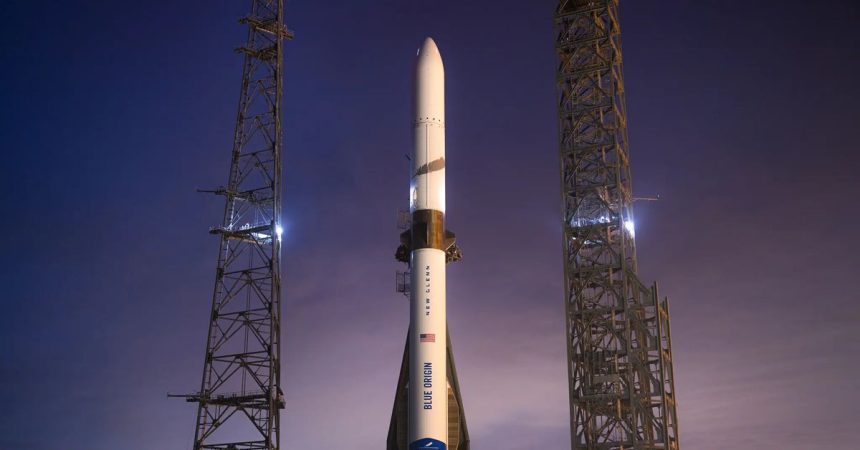Blue Origin, the commercial space venture founded by Jeff Bezos, is poised to embark on a pivotal mission with the inaugural launch of its New Glenn rocket. This monumental event, slated for January 12th from Cape Canaveral, Florida, represents a culmination of nearly a decade of development and carries significant implications for the future of the commercial space industry and the burgeoning satellite internet market. The success of New Glenn could directly challenge the established dominance of Elon Musk’s SpaceX, sparking a new era of competition in space exploration and related technologies.
The New Glenn, a colossal 320-foot-tall rocket named after pioneering astronaut John Glenn, is designed to transport cargo, satellites, and eventually, human passengers into space. Its first stage is powered by seven BE-4 engines, a proprietary design fueled by a combination of liquified natural gas and liquid oxygen. A key feature of the New Glenn is its reusability. The first stage is engineered to land vertically on a sea-based platform after launch, allowing for retrieval and refurbishment for at least 25 missions. This cost-saving strategy mirrors SpaceX’s approach with the Falcon 9, aiming to significantly reduce the expense of space travel. The rocket’s disposable upper stage houses the payload, boasting a substantial carrying capacity of 13 metric tons to geostationary transfer orbit and 45 metric tons to low Earth orbit. Blue Origin emphasizes the rocket’s safety and redundancy systems, designed to ensure the safety of future crewed missions.
The development of New Glenn hasn’t been without its challenges. Initially planned for a 2020 launch, the project faced repeated delays due to technical hurdles, including issues with the BE-4 engine development. However, these setbacks have allowed for further refinement and testing, ultimately contributing to the rocket’s readiness for its maiden flight. The New Glenn’s payload capacity is comparable to SpaceX’s Falcon Heavy, but it features a significantly larger cargo bay, providing a potential advantage in transporting larger payloads. The successful launch of New Glenn could significantly escalate the rivalry between Blue Origin and SpaceX, particularly in the competition for lucrative government contracts and the evolving landscape of satellite internet access.
The New Glenn’s inaugural launch will carry the Blue Ring Pathfinder, a payload designed to test Blue Origin’s Blue Ring spacecraft. This pathfinder mission will evaluate the spacecraft’s capabilities in communications, power systems, flight computing, and its potential for supporting future missions through in-space refueling, hosting platforms, data relay, and cloud computing services. While reaching orbit is the primary objective of this first launch, successfully landing the reusable first stage booster is considered a secondary, yet highly desirable, outcome. Blue Origin has meticulously prepared for this moment, emphasizing that real-world flight testing is essential for validating years of ground testing and simulations. Regardless of the specific outcome of this launch, the data gathered will be invaluable for refining future missions and continuing the development of New Glenn.
The impact of New Glenn extends beyond cargo transport to the realm of satellite internet. Amazon’s ambitious Project Kuiper, aiming to create a network of over 3,200 satellites to provide global internet access, will rely heavily on the New Glenn. Although initial Project Kuiper satellites are scheduled for launch aboard SpaceX’s Falcon 9, New Glenn will become the primary launch vehicle for future deployments. This places Blue Origin in direct competition with SpaceX’s Starlink, which already boasts a constellation of over 6,000 satellites. The success of New Glenn will be crucial for Amazon’s ability to compete effectively in this rapidly growing market. The race between Project Kuiper and Starlink to establish dominant global satellite internet constellations will likely shape the future of internet access for millions worldwide.
This inaugural launch of New Glenn marks a critical juncture for Blue Origin. It represents not only the realization of years of intensive development and investment but also signifies a bold step towards reshaping the dynamics of the commercial space industry. The successful deployment of New Glenn will position Blue Origin as a major player alongside SpaceX, driving innovation and competition in space exploration and technology advancements. Furthermore, it will lay the groundwork for Amazon’s Project Kuiper to challenge Starlink’s dominance, ultimately influencing the future of global internet connectivity. The world watches with anticipation as New Glenn prepares to ascend, ushering in a new era of possibilities for space exploration and its terrestrial applications.



